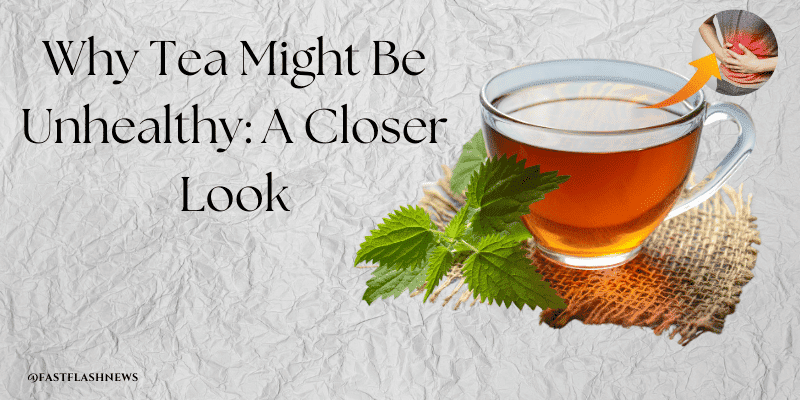Tea has a darker side that is rarely highlighted, and Tea Might be Unhealthy despite being widely recognized for its many health benefits.
Even though many people still adore tea, there are several features of tea drinking that might be harmful to your health. Here’s a closer look at the potential health risks associated with tea.
High Level of Caffeine
Effect on Sleep: Caffeine is a common ingredient in tea, particularly in the black and green kinds. Overindulgence in caffeine can cause sleep disturbances that result in restlessness and insomnia.
Dependency and Withdrawal: Consistent caffeine use may result in dependency. If you skip your regular cup, you can experience headaches, irritability, and lethargy as withdrawal symptoms.
Iron Absorption and Tannins
Nutrient Absorption: The tannins in tea have the potential to obstruct the body’s ability to absorb iron from plant-based diets. For those suffering from iron-deficiency anemia, this is especially alarming.
Stomach Problems: When tea is drunk on an empty stomach, tannins can exacerbate gastrointestinal symptoms, including nausea and stomach aches.
Pesticide Residues
Contamination Concerns: Teas that aren’t organic may include pesticide residues and other dangerous substances. Over time, consuming these residues may cause hormone imbalance and an increased risk of cancer, among other health problems.
Variations in Quality: Tea’s quality can differ greatly, with lower-quality teas potentially containing more impurities.
Content of Fluoride
Dental and Bone Health: Fluoride from the soil is accumulated by tea plants. Too much fluoride can exacerbate disorders including dental and skeletal fluorosis, which damage teeth and bones.
Daily Fluoride Intake Risks: Those who regularly drink tea may consume more fluoride than is advised, which could have long-term health effects.
Kidney stones and oxalates
Kidney Health: High oxalates are present in several teas, especially black tea. In those who are vulnerable, a high oxalate diet may cause kidney stones to develop.
Hydration Myths: Although tea increases the amount of fluids consumed, its diuretic effects can cause dehydration if water consumption is not balanced out.
Sweeteners and Additives
Hidden Sugars: A lot of commercial tea products have artificial sweeteners and added sugars, which can exacerbate metabolic problems including diabetes and obesity.
Artificial Flavors: Preservatives and artificial flavors are added to some teas, which may be harmful to your health.
Possible Allergens
Allergy Reactions: Sensitive people may experience allergic reactions from several herbal teas. Some ingredients can cause allergic reactions, such as peppermint, chamomile, and others.
Cross-contamination: People with food allergies may be at danger from teas prepared in facilities that handle different allergens.
Even though many people find tea to be a pleasant and healthy beverage, it’s important to be aware of the possible health hazards connected to its usage. Some of these dangers can be reduced by using moderation and thoughtful tea product selection, with a preference for organic and premium sources. If you have any specific health concerns about drinking tea, you should always speak with a healthcare provider.




